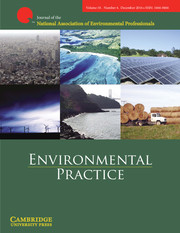No CrossRef data available.
Article contents
RESEARCH ARTICLE: Collaborative Relicensing Revisited: The Spokane River Alternative Licensing Process
Published online by Cambridge University Press: 31 January 2007
Abstract
In a previous study of hydropower project relicensing, the author suggested that a consultative, consensus model of policy making, based on extensive negotiations between stakeholder interests, holds the greatest potential to achieve broadly conceived public policy goals. This article examines the effort of Avista Utilities to relicense five hydropower facilities on the Spokane River in Idaho and Washington using an Alternative Licensing Process, or ALP. This effort was patterned after an earlier one on the Clark Fork River in western Montana, where Avista was able to negotiate with a number of different stakeholders a consensus agreement that included changes in facility operation and mitigation of adverse ecological effects. Yet in the Spokane River case, the effort to reach a consensus agreement was unsuccessful. This article argues that irreconcilable differences over the water resource created a multiple-level conflict between stakeholders (Avista, upstream property owners, downstream users) to protect or challenge the established distribution of costs and benefits. The article suggests that a consultative model of policy making may not be appropriate in all cases and concludes with a brief examination of other models of relicensing policy making—the Integrated Licensing Process, the traditional model, and the political model.
- Type
- FEATURES & REVIEWS
- Information
- Copyright
- © 2006 National Association of Environmental Professionals




